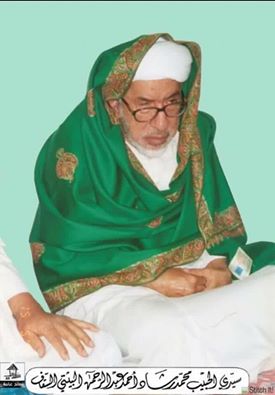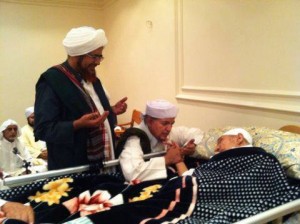Habib Muhammad Rashad bin Ahmad al-Bayti was a descendant of Shaykh Abd al-Rahman al-Saqqaf. He was born in 1344 (1926) in the town of Kaninah near Yemen’s Indian Ocean coast. His father died when he was eleven so it was his mother and his paternal uncle who took care of his development. He had a love for knowledge from an early age despite the environment around him in which ignorance prevailed. In fact he rarely mixed with his peers, which led one of his relatives to say to his mother that there was something wrong with him. His mother had great insight, however, and replied that her son would go on to great things, that he would rise far above his peers and that he would one day judge between them, which indeed happened.
He was known for always praying the five prayers in the mosque and reciting the Qur’an between Maghrib and Isha, as is the practice in the mosques of Hadramawt. He began seeking knowledge in earnest and when his shaykh left the town he sought permission from his mother to go to study in Tarim. She said to him: “Who will look after me, an old blind woman? Stay with me and Allah will bring someone to teach you in your hometown.” Sure enough, a short time later Shaykh Muhammad al-Amudi arrived in the town and Habib Muhammad spent years learning from him.
Habib Muhammad had always longed to go Tarim and the opportunity finally arose some years later. He visited Habib Mustafa al-Mihdar in Dawan on the way and then spent four months in the Ribat of Tarim while consistently attending the lessons of Habib Alawi bin Shihab. He also learned from Habib Muhammad bin Salim bin Hafiz and took ijazah from Habib Alawi bin Tahir al-Haddad who happened to visit Tarim at that time. He later visited Tarim a second time and took ijazah from Habib Muhammad bin Hadi al-Saqqaf.
In 1389 (1970) he performed hajj and visited the Prophet ﷺ for the first time. He attended the gatherings of Habib Ahmad Mashhur al-Haddad in Jeddah and met with Sayyid Alawi al-Maliki, Shaykh Hassan Mashat and Sayyid Muhammad Amin Kutbi in Makkah.
The knowledge that he had gained led the scholars of the region to insist that he be appointed as a judge. He tried to refuse, but he eventually took up the position of qadi in the town of Hajr. Hajr was known for the roughness and tribal mentality of its people but he remained in that position for sixteen years. He was loved and respected by all due to his justice and good character. At one point someone who he had ruled against opened fire on his house but he patiently bore trials such as this and others. After the court in Hajr was closed, Habib Abdullah Mahfuz al-Haddad requested that he come to Mukalla. He was then made qadi in the city of al-Shihr.
The turmoil which followed the Communist take over of the region led him to settle in the Hijaz. His house in Jeddah was always open for students of knowledge and visitors.
Habib Muhammad was extremely humble and would refer to himself as nothing but a bedouin from Hajr. He loved nothing better than discussing fiqh and had a great concern for students of the sacred sciences. He authored a useful commentary on the grammar text ‘al-Ajurrumiyyah’ entitled ‘al-Taqrirat al-Bahiyyah’ published by Dar al-Minhaj.
He passed away in Jeddah on 2nd Muharram 1438 (3rd October 2016) at the age of 93 after a long life in service of Islam. He was bed-ridden for the last eight years of his life but he patiently accepted his state. The death of Habib Abd al-Qadir al-Saqqaf in 1431 / 2010 had a huge spiritual effect upon him.
Habib Ali al-Jifri recalls studying Habib Ahmad bin Zayn al-Habashi’s al-Risalah al-Jamiah with him at a young age, which is traditionally the first text that any student studies. Habib Muhammad would insist that he was not worthy of teaching. Habib Ali maintained his relationship with Habib Muhammad, who would always give him advice and direction. When Habib Muhammad lost the ability to speak he continued to give him advice in writing.
May Allah pour His mercy upon Habib Muhammad, allow us to benefit from him and fill the gap that his death has left in the Ummah.


